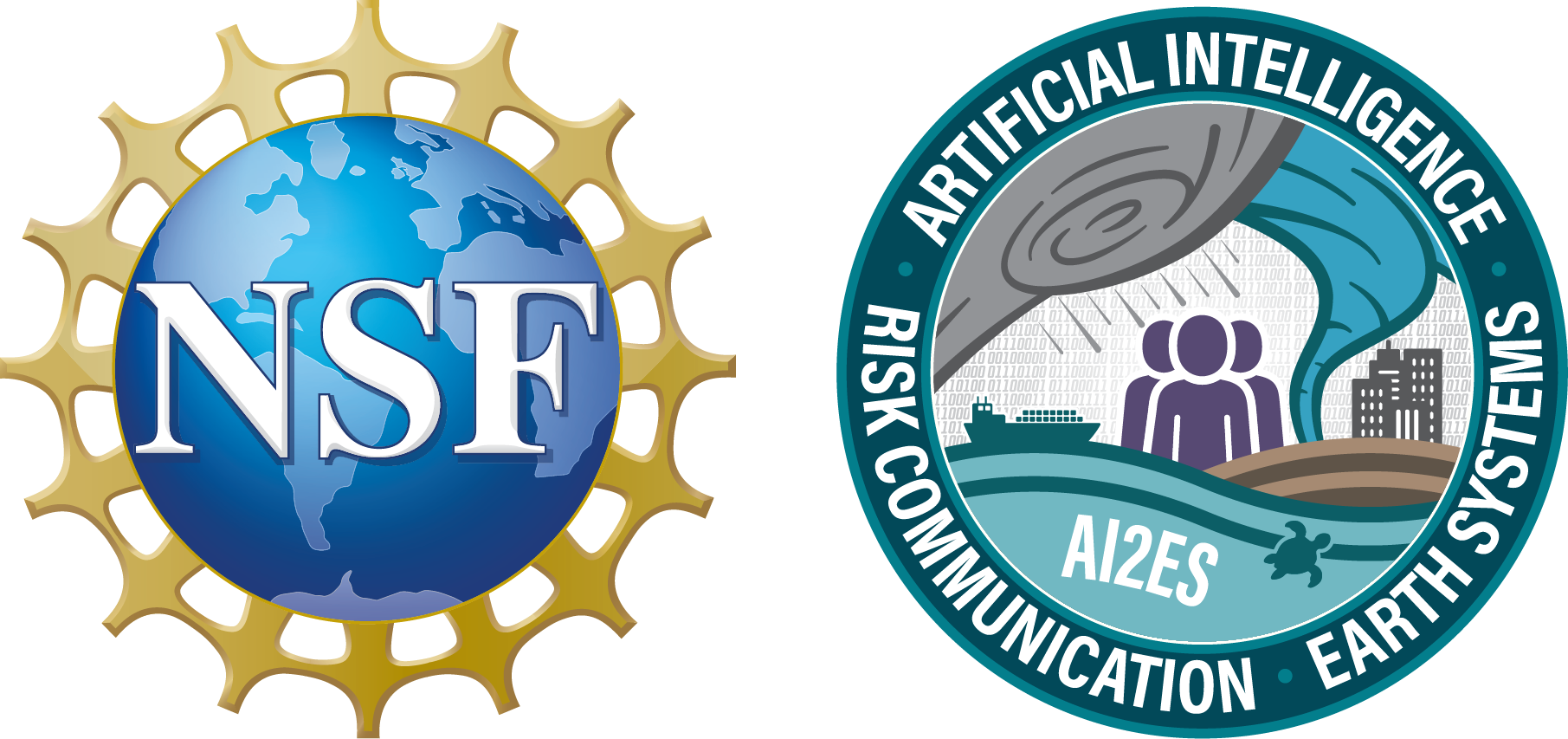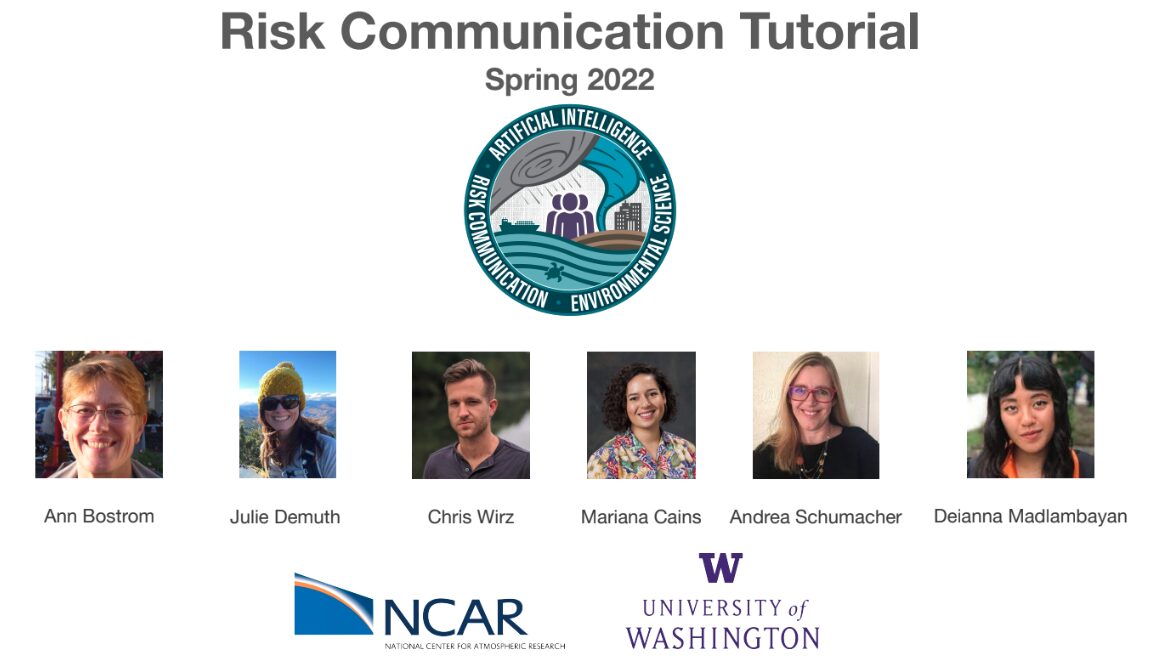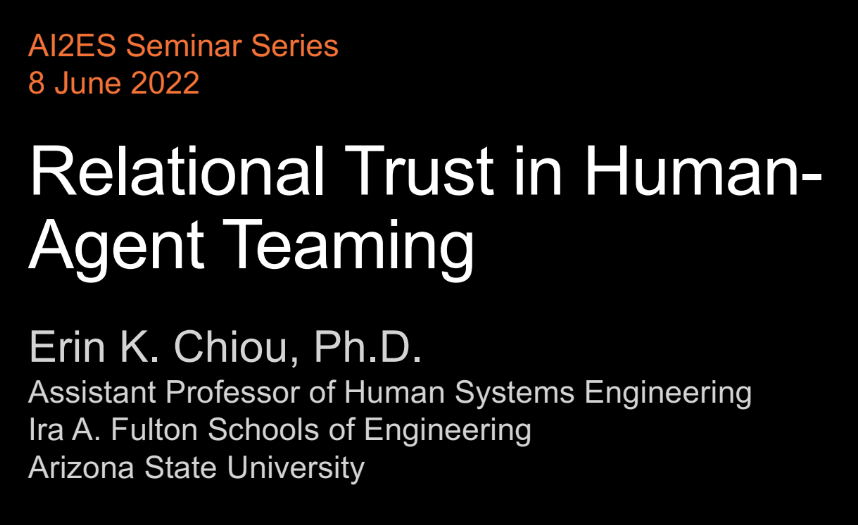Outreach
Courses, Tutorials, Workshops, and Resources
Publicly available educational resources for AI and Machine Learning.

Short Courses and Tutorials
Open source tutorials on advanced, trustworthy AI methods for workforce retraining and support.

Academic Courses
Groundbreaking courses developed and taught by AI2ES faculty addressing the most critical problems in AI and science.

Trustworthy AI Glossary
Informative glossary of key terms related to trustworthy, ethical, and robust AI.
Short Courses and Tutorials
Tutorial: Tuning Deep Learning Training & Evaluation on the OU Supercomputer
March 21, 2023
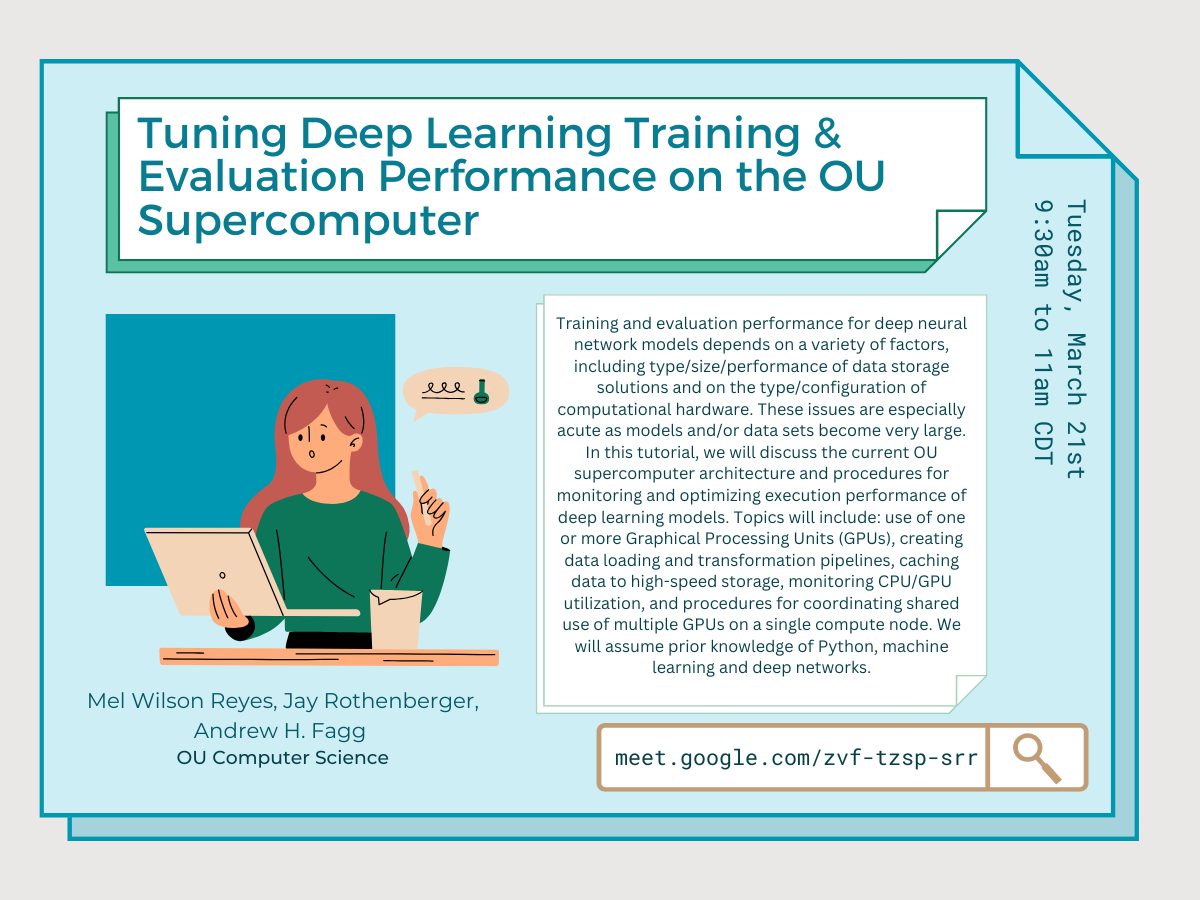
Publicly Available: Recording, Slides
Synopsis: Training and evaluation performance for deep neural network models depends on a variety of factors, including type/size/performance of data storage solutions and on the type/configuration of computational hardware. These issues are especially acute as models and/or data sets become very large. In this tutorial, we discuss the current OU supercomputer architecture and procedures for monitoring and optimizing execution performance of deep learning models. Topics include: use of one or more Graphical Processing Units (GPUs), creating data loading and transformation pipelines, caching data to high-speed storage, monitoring CPU/GPU utilization, and procedures for coordinating shared use of multiple GPUs on a single compute node. We assume prior knowledge of Python, machine learning and deep networks.
Presenters: Mel Wilson Reyes, Jay Rothenberger, Andrew Fagg (OU)
Transformers Short Course
November 15 – 30, 2022
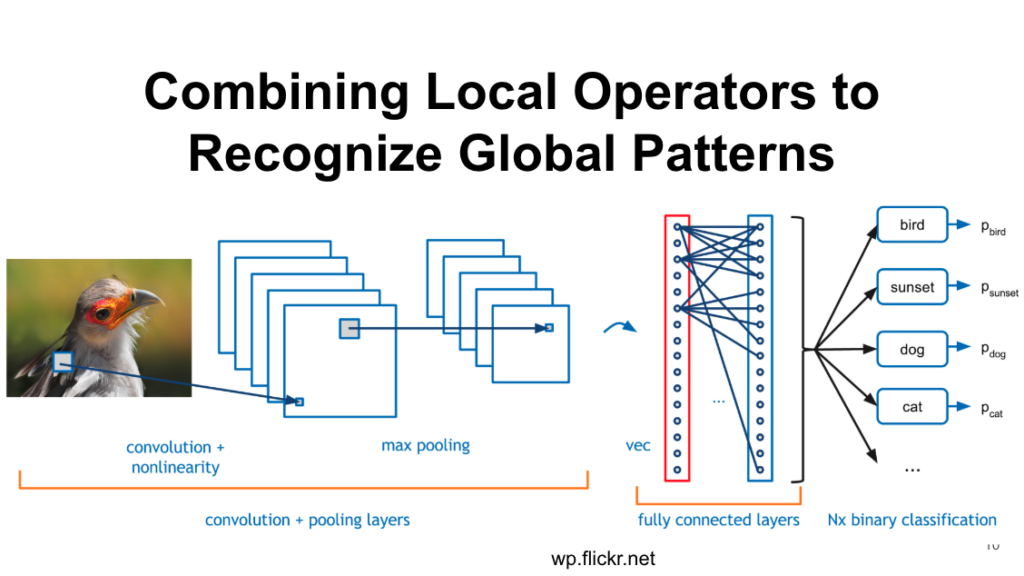
A 4-part virtual short course on transformers.
- Transformers Part I: Recurrent Neural Networks & the Gradient Problem; Solutions using Attention – Andrew H. Fagg. Recording, Slides
- Transformers Part II: Positional Encodings and the Basic Transformer Architecture – Andrew H. Fagg. Recording, Slides (for Sessions 1 and 2)
- Transformers Part III: Transformers in 2D – Andrew H. Fagg. Recording, Slides (for Sessions 1-3)
- Transformers Application: Transformer for Meteorological Forecasting Based on Multi-dimensional Input Data – Hamid Kamangir. Recording, Slides
Machine Learning Tutorial for Earth Scientists
Online, 2022
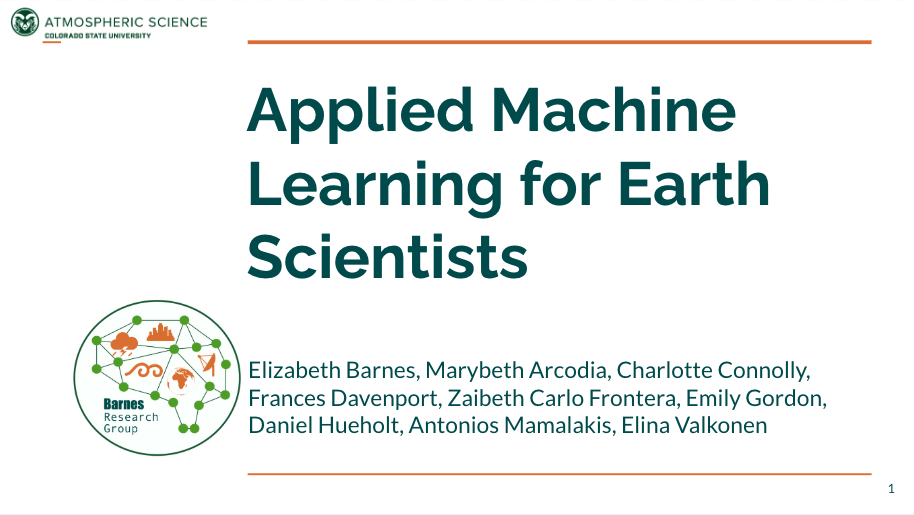
Publicly Available: Slides, GitHub
A gentle introduction to machine learning for Earth scientists. This short covers topics such as machine learning for science, foundational concepts of ML, decision trees, random forests, artificial neural networks, ethical use of AI in Earth science, implementation and assessment of neural networks, methods of explainable AI (XAI), and simple uncertainty quantification.
Instructor: Elizabeth Barnes, Colorado State University
Getting Started With Machine Learning
Online Tutorial and Resources
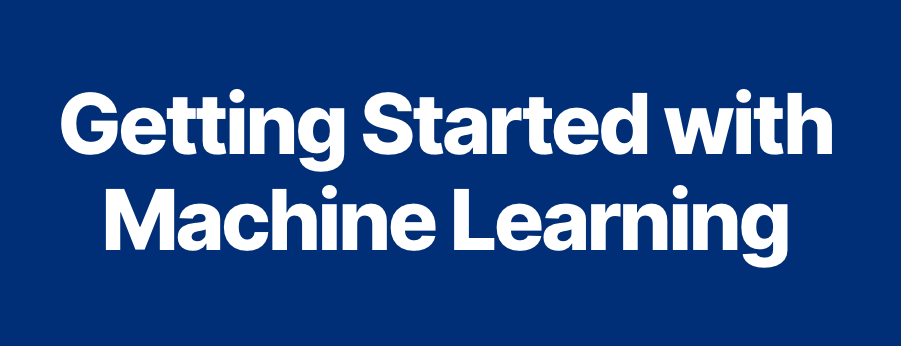
Publicly Available: Website
Online tutorial and resources to get started with Machine Learning
A non-exhaustive list of resources to help environmental scientists get started with machine learning, including tutorials with code.
Instructor: Tom Beucler, University of Lausanne
Trustworthy Artificial Intelligence for Environmental Science (TAI4ES) Virtual Summer School 2022
June 27 – 30, 2022
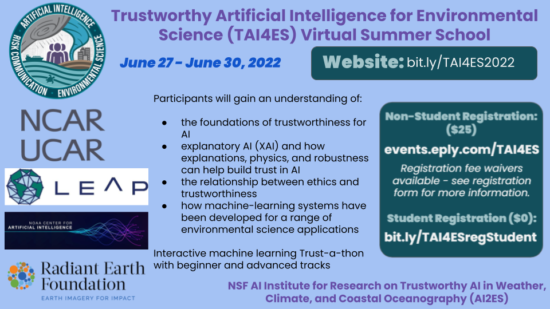
Publicly Available Resource Links: Course Information, interactive blog for students, slides, user personas, and GitHub.
Offered by AI2ES and NCAR with partners LEAP, NCAI, and the Radiant Earth Foundation. Includes interactive, machine learning Trust-a-thon with beginner and advanced tracks
Participants will gain an understanding of:
- the foundations of trustworthiness for AI
- explanatory AI (XAI) and how explanations, physics, and robustness can help build trust in AI
- the relationship between ethics and trustworthiness
- how machine-learning systems have been developed for a range of environmental science applications
Risk Communication for Trustworthy AI: Six-part Tutorial
May 24 – June 21, 2022
Six-part tutorial on risk communication fro trustworthy AI from AI2ES members and prominent, invited researchers in the field.
This tutorial begins by putting risk communication research into context and introducing basics of risk perception and communication. It includes sessions on the role of trust in risk communication, and the design of risk communications and messages, and two related site-wide talks by guest speakers who are conducting research on formalizing trust in AI, and on human-AI teaming, respectively. Discussions, polls, and exercises are included to promote active learning. The concluding session focuses on what we can learn from iconic risk communication studies and meta-analyses for two topics: warnings, and fear appeals.
Recorded Sessions and Discussions:
- Intro to risk perception, risk communication. AI2ES Members. Recording; Slides
- Prerequisites, Causes, and Goals of Human Trust in AI. Ana Marasović. Recording
- Trust in risk communication. AI2ES Members. Recording; Slides
- Relational trust in human-agent teaming. Erin Chiou. Recording; Slides
- Risk communication and message design basics. AI2ES Members. Recording; Slides
- Iconic studies in risk communication (e.g., warning effectiveness). AI2ES Members. Recording; Slides
AI2ES/CIRA Short Course on Explainable Artificial Intelligence for Environmental Science
May 10 – June 21, 2021
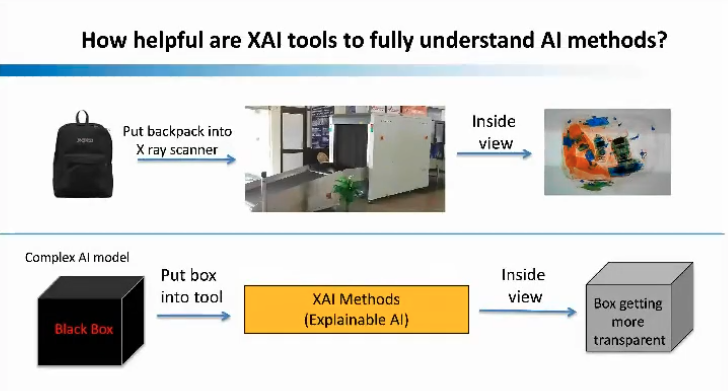
Publicly Available: Course Information and Recordings, GitHub
The short course consists of six 90-minute lectures, each accompanied by slides and a Colab notebook with open-source Python code.
All Python examples will focus on weather prediction. Made in collaboration between Cooperative Institute for Research in the Atmosphere (CIRA) and AI2ES.
Trustworthy Artificial Intelligence for Environmental Science (TAI4ES) Virtual Summer School 2021
July 26 – 29, 2021
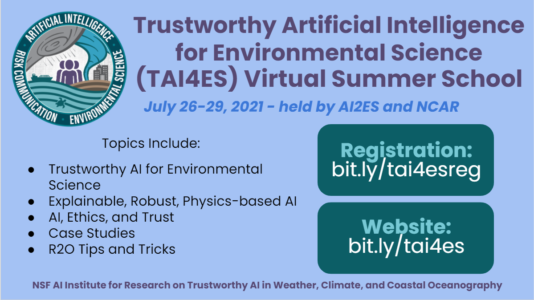
Publicly Available: Course Information, Slides and Recordings
The TAI4ES Summer School will focus on getting attendees up-to-speed on how to develop trustworthy AI for the Earth & environmental sciences. Each morning, students will participate in lectures from leading researchers in trustworthy AI for environmental sciences.
Topics include Trustworthy AI for Environmental Science; Explainable, Robust, Physics-based AI; AI, Ethics, and Trust; Case Studies; R2O Tips and Tricks.
Hosted jointly by AI2ES and NCAR.
Artificial Intelligence For Earth System Science (AI4ESS) Summer School
June 22 – 26, 2020
Publicly Available: Slides and Recordings
The AI4ESS Summer School is a week long interactive course covering essential and cutting edge topics in artificial intelligence, machine learning, and deep learning that are relevant for Earth System Science problems. Host: National Center for Atmospheric Research (Boulder, Colorado, USA)
Machine Learning in Python for Environmental Science Problems
April 8 – 9, 2021
Hosted by American Meteorological Society, co-developed by AI2ES
Interest in artificial intelligence, machine learning, and deep learning in the environmental sciences has grown rapidly in conjunction with the increased presence of these technologies in our daily lives. Many people now want to apply machine learning to their own data and problems but do not know where to start. This 2-day virtual short course will develop your skills in applying Python libraries to process your data, train a variety of machine-learning models, generate predictions, and evaluate and interpret your trained models for physical understanding.
2nd NOAA Workshop On Leveraging AI In Environmental Sciences
July 30, 2020 – February 25, 2021
Host: National Oceanic and Atmospheric Administration’s STAR Center for Satellite Applications and Research, co-developed by A2ES members.
The workshop will build on the success of the 1st Workshop on Leveraging AI. This workshop will help gather scientists, program managers, and leaders from public, academic and private sectors. It will enable experts involved in the development and adaptation of AI tools and applications in a number of fields to meet and exchange experiences.
Workshop includes presentations, posters, panel discussions, and tutorials.
Resource Links: Tutorial sessions, Workshop Information
CIRA Short Course On Machine Learning For Weather And Climate
September 16 – October 21, 2020
Short course on machine learning for weather and climate. Instructors:
- Dr. Ryan Lagerquist (CIRA Boulder and NOAA GSL)
- Dr. Imme Ebert-Uphoff (CIRA Fort Collins and Colorado State University)
Recorded video lectures, GitHub, and Jupyter Notebooks are publicly available on the CIRA website.
Academic Courses
Ethical AI for the Earth Sciences (METR 4083/5083)
Dates: Spring semester 2024
Publicly Available Online: This course focuses on how to ethically and responsibility create Artificial Intelligence (AI) for a wide variety of Earth and environmental sciences (ES). Topics include responsible conduct of research, ethical scientific conduct, ownership of ideas, algorithms and data, and ethics of developing AI for ES applications.
Instructor: Dr. Amy McGovern, Lloyd G. and Joyce Austin Presidential Professor, School of Computer Science and School of Meteorology, and Director of the NSF AI Institute for Research on Trustworthy AI in Weather, Climate, and Coastal Oceanography, University of Oklahoma.

Artificial Intelligence (CS 4013/5013)
Dates: Fall semester 2023
Publicly Available Online: In this course, you will learn how to create intelligent agents. You will create intelligent teams of agents in a game that must search, adapt, and communicate in order to thrive. As with agents in a heterogenous real-world environment, these agents will require you to design and implement them to fit into an existing software framework.
Instructor: Dr. Amy McGovern, Lloyd G. and Joyce Austin Presidential Professor, School of Computer Science and School of Meteorology, and Director of the NSF AI Institute for Research on Trustworthy AI in Weather, Climate, and Coastal Oceanography, University of Oklahoma.
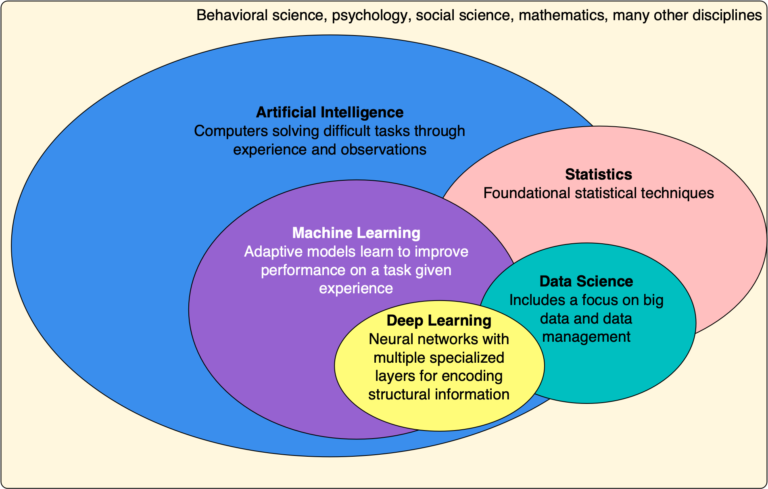
Introduction to Artificial Intelligence (GISC 1372)
Dates: Every Spring and Fall semester
Offered through Del Mar College: This community college course provides a broad overview of Artificial (AI) with its application to variety of industries. The use of unsupervised and supervised machine learning for creating AI solutions will be explored. The ethical collection and use of data will be explained and demonstrated.
Instructor: Phillip Davis, professor in the Computer Science department at Del Mar College
This course is part of a larger schedule of courses that compose the Artificial Intelligence in GIS Occupational Skills Award. A novel, community college certificate program co-developed with AI2ES faculty.
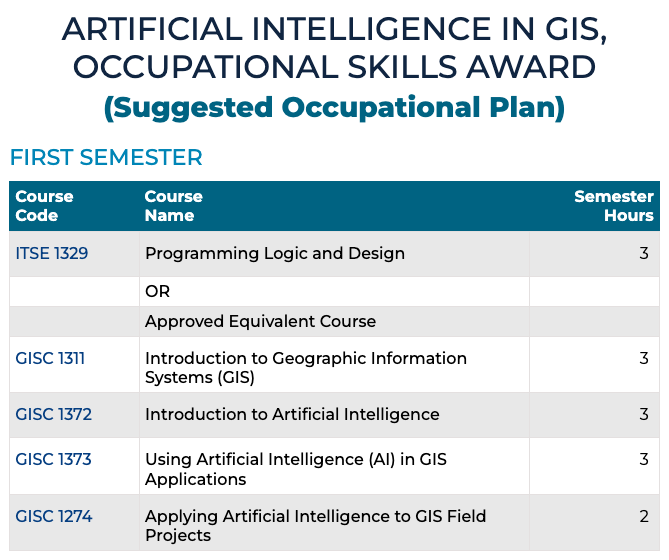
Machine Learning for Atmospheric Sciences (AT 780A7)
Dates: Fall 2023, Spring 2022
Course Materials Publicly Available (Syllabus, GitHub): An overview of machine learning methods used to interpret data sets in the atmospheric/Earth sciences with an emphasis on implementation and interpretation of the results, including learning new science. Topics include foundational concepts in machine learning, random forests, basic neural networks, advanced neural networks, unsupervised learning, and new frontiers in the field.
Instructor: Dr. Elizabeth Barnes is a Professor of Atmospheric Science at Colorado State University. Her research focuses on understanding Earth system variability, predictability, and change across time and space, with an emphasis on developing and implementing artificial intelligence tools in a way that mimics scientific human reasoning to improve intrinsic interpretability.
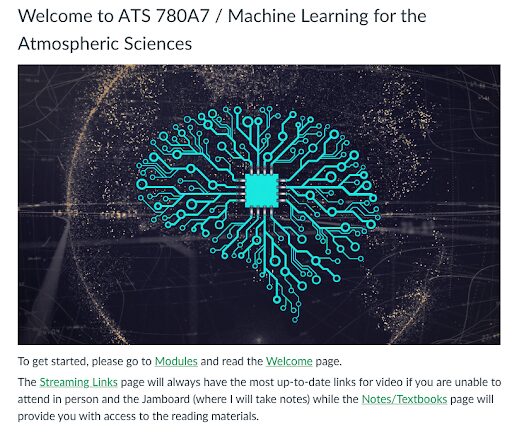
AI, Ethics, and Geoethics (CS 5970)
Dates: Spring semester 2021
Publicly Available Online: This course will focus on topics in ethics of Artificial Intelligence (AI) and environmental sciences (ES)/geosciences as well as the intersection of the two. The course will also include responsible conduct of research, including ethical scientific conduct and the ownership of ideas, algorithms and data but will focus on these themes as specifically related to AI and ES.
Instructor: Dr. Amy McGovern, Lloyd G. and Joyce Austin Presidential Professor, School of Computer Science and School of Meteorology, and Director of the NSF AI Institute for Research on Trustworthy AI in Weather, Climate, and Coastal Oceanography, University of Oklahoma.
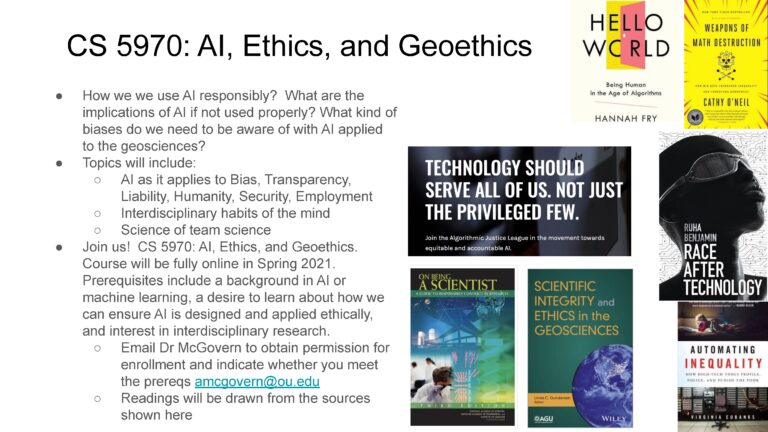
Artificial Intelligence (CS 4013/5013)
Dates: Fall semester 2022
Publicly Available Online: This course includes the study of the methods of search, knowledge representation, heuristics, and other aspects of automating the solution of problems requiring intelligence.
Instructor: Dr. Amy McGovern, Lloyd G. and Joyce Austin Presidential Professor, School of Computer Science and School of Meteorology, and Director of the NSF AI Institute for Research on Trustworthy AI in Weather, Climate, and Coastal Oceanography, University of Oklahoma.
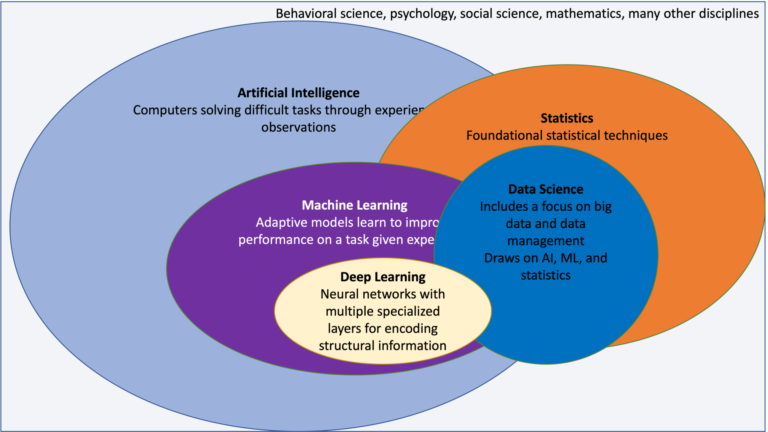
Artificial Intelligence (CS 4013/5013)
Dates: Fall semester 2021
Publicly Available Online: This course includes the study of the methods of search, knowledge representation, heuristics, and other aspects of automating the solution of problems requiring intelligence.
Instructor: Dr. Amy McGovern, Lloyd G. and Joyce Austin Presidential Professor, School of Computer Science and School of Meteorology, and Director of the NSF AI Institute for Research on Trustworthy AI in Weather, Climate, and Coastal Oceanography, University of Oklahoma.
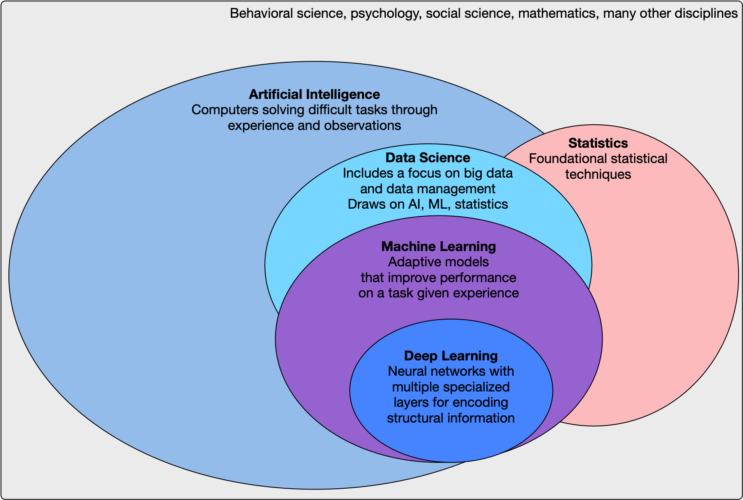
Trustworthy AI Glossary
Welcome to the AI2ES Glossary. Click each word below to see a detailed definition and information about each Artificial Intelligence and Machine Learning term.
- Artificial Intelligence (AI) – Artificial Intelligence is the science and engineering of building machines that perform tasks normally associated with human intelligence.
- Bias, Computational/Model – The various forms of mathematical bias that arise due to the choice of model and parameters of interest for a given dataset. These biases include but are not limited to: the bias-variance tradeoff, frequency bias, and/or inductive bias.
- Bias, Data – A class imbalance or distortion in the data from what we know is true based on meteorological and other knowledge of interest.
- Bias, Decision-making – The biases that arise due to how people perceive, think, remember, and represent events and phenomena and use these heuristics in their problem-solving and decision-making.
- Ethical AI – A responsible approach to AI that ensures certain properties such as fairness, robustness, privacy respecting, and transparency are upheld during model development, deployment, and monitoring.
- Explainability – The degree to which a human can derive meaning from the entire model and its components through the use of post-hoc methods (e.g., verification, visualizations of important predictors).
- Machine Learning (ML) – A field of study within Artificial Intelligence that involves using computer algorithms that can improve and adapt automatically through continual experience with data.
- Interpretability – The degree to which a human can derive meaning from the entire model and its components without the aid of additional methods.
- Responsible AI – The development of AI systems where the affected populations are included in model development and the model is applied to situations in which its output is understood.
- Robust AI – An AI system that fails in a responsible and graceful way and is resistant to adversarial attacks.
- Trust – The willingness to assume risk by relying on or believing in the actions of another party.
- Trustworthiness – A trustee’s evaluation, or perception, of whether, when, why, or to what degree someone or something should or should not be trusted.
Related Institute Publications
Why we need to focus on developing ethical, responsible, and trustworthy artificial intelligence approaches for environmental science. McGovern et al. 2022. DOI:10.1017/eds.2022.5
Advancing AI in Earth System Science Research
Join us to unlock AI’s potential in science.
